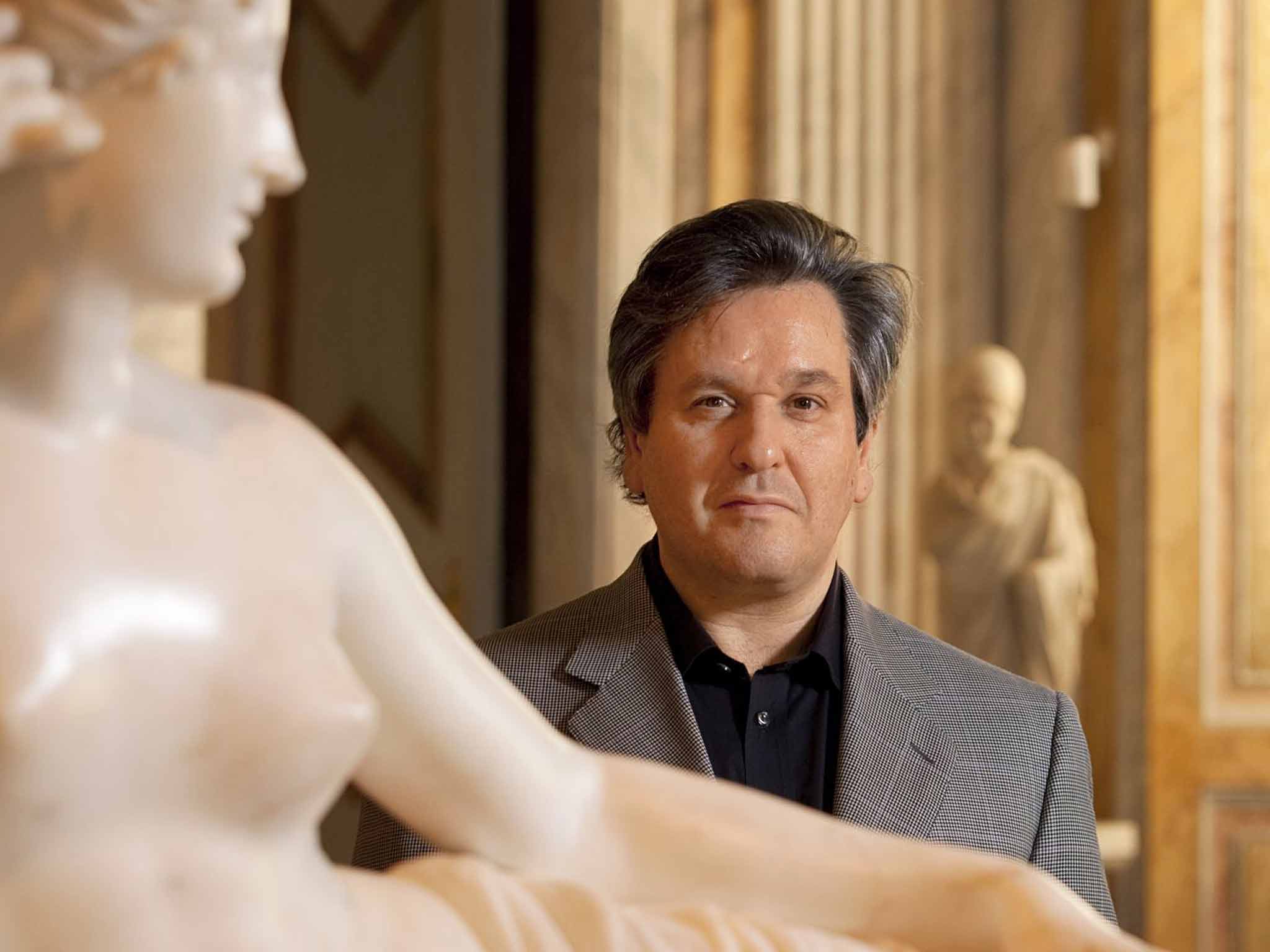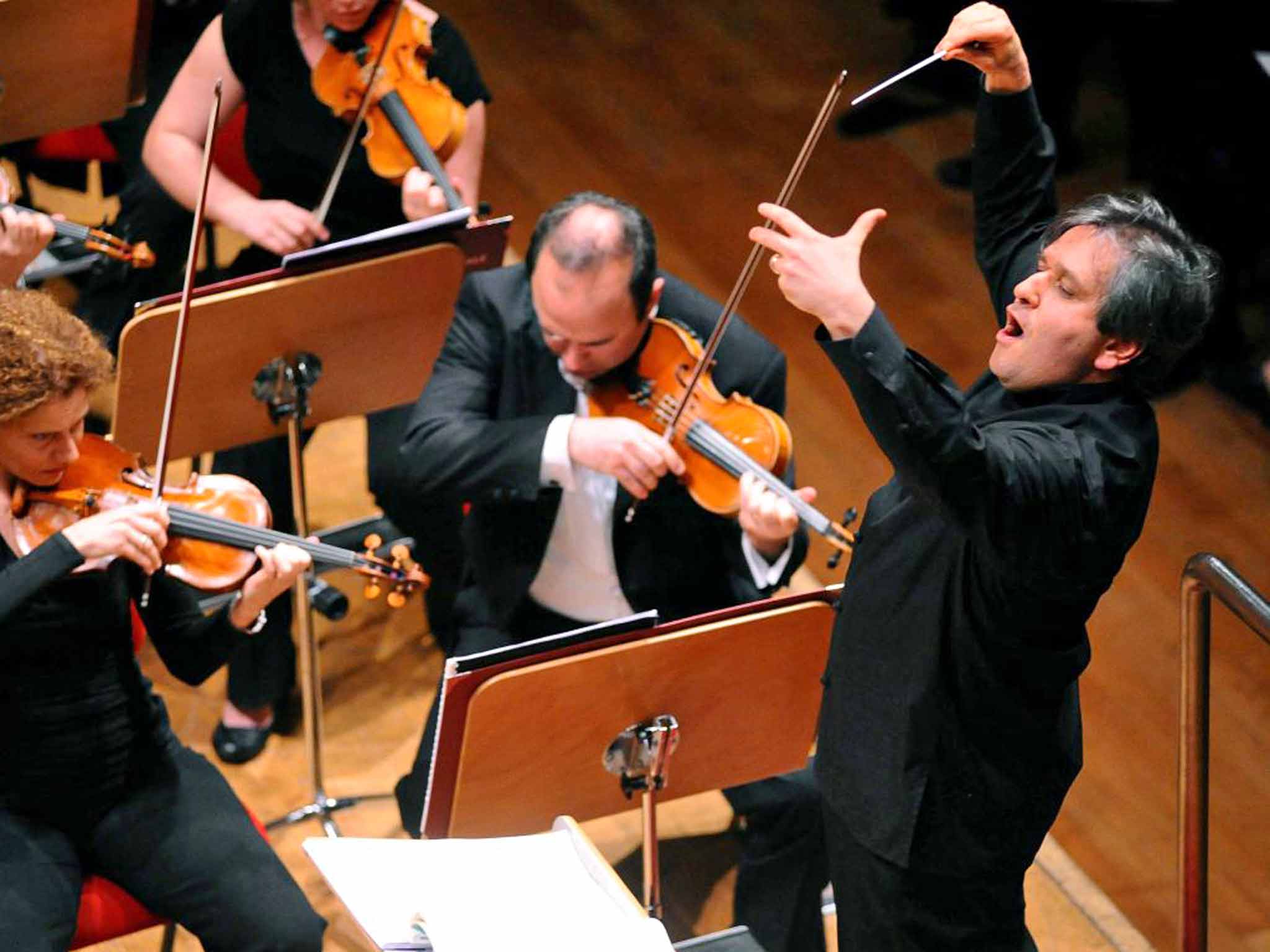Sir Antonio Pappano: Conducting gave me Tennis elbow'
Covent Garden's musical director, Sir Antonio Pappano, tells Jessica Duchen about funding crises, new productions, cinema broadcasts, and the pain of wielding the baton

Sir Antonio Pappano has great expectations, in more ways than one. The Dickens novel is on the table in his Royal Opera House office; he is halfway through. Reading, he says, is his prime relaxation, not least because it's quiet. And quiet is in short supply for Pappano as music director of the UK's top lyric theatre, where great summer expectations include its first production in 30 years of Puccini's opera Manon Lescaut, opening tonight.
Opera's sheer theatricality seems to run in Pappano's veins – and it has to, since being a music director involves much more than conducting. "Every day we remind ourselves that we are a theatre – so theatre values, drama, happenings, tension, beauty, poetry and their opposites, that's what we're about," Pappano says. "Everything has to mesh: the only good opera is opera that puts all its disciplines into a beautifully sewn tapestry. Opera is about a show – that's what we're here for – and my job is to try to set an example."
Pappano, 54, is an international man in an international job, which he has held for 12 years. He was born in Essex to Italian parents, then raised largely in Connecticut and his upward path included – among many other things – being a rehearsal pianist for New York City Opera, besides playing in a cocktail bar. Today he still sounds very much a New Yorker, even though he mainly divides his time between Covent Garden and Rome, where he is principal conductor of the Orchestra dell'Accademia Naziolane di Santa Cecilia.

He is also popular as a front man for occasional opera documentaries on TV, for which his positive, enthusiastic and communicative style is ideally suited ("I'd love to do more of that," he says). But he does not mind hitting where it hurts, having spoken out a year or two ago about the way singers' cancellations plague opera houses worldwide. "I have to be careful, because conductors cancel too," he admits.
He himself needed time off last year. "I had very bad tennis elbow and I have since given up using a baton – I don't use it at all now and that has helped me very considerably – with the baton, somehow the grabbing of it goes right here [taps forearm muscles]. I'd also that season been conducting The Trojans, Meistersinger and The Marriage of Figaro, which was the shortest – can you imagine? – so it was asking for trouble and when I did four Ring cycles I was finished." Now he has dispensed with the baton, he conducts simply with his hands and skewer-sharp gaze. "What I do is 0.001 per cent glamour," he declares. "The rest is sore neck, back pain and laundry. But my goodness, right now I'm doing Manon Lescaut and Ariadne auf Naxos – talk about a kid in a candy store."
Manon Lescaut is based on Abbé Prévost's novel about a young woman torn between love and money; it is a rarity, Pappano says, because its immensely difficult leading roles require "the perfect people". Jonathan Kent's new production may just have them. Manon is Kristine Opolais, the charismatic Latvian soprano who has triumphed at the ROH as Madame Butterfly and Tosca; and Chevalier des Grieux is sung by Jonas Kaufmann, who has risen to become the kind of superstar opera is lucky to find once in a generation.
"Jonas is very intelligent, and he's multilingual," says Pappano, "so he is equally at home in French, Italian and German repertoire. He's very observant in rehearsals and doesn't take things unless he's convinced, so he's constantly exploring ways through suggestion – and sometimes through irritation – to find what's right. And he has such a wonderful technique. I grew up with a father who was a singing teacher and now I listen to Jonas's vocal technique and, trust me, he doesn't put a foot wrong. That he has the swagger, the looks and the musicality – that's a plus. And it's one hell of a package."
An international audience can enjoy the results in a cinema relay on 24 June. A few weeks ago the runaway success of these broadcasts was challenged when a report suggested they might not draw people on to attend live performances. Pappano, though, insists that was never the point. "When we broadcast to more than 1,000 cinemas worldwide, those people are not going to come to Covent Garden – they live too far away or they can't afford it," he says. "But my mother can watch me conduct from Connecticut. How brilliant is that?"
In July he and the company head to Symphony Hall, Birmingham, for a concert performance of Strauss's Ariadne auf Naxos – touring is, he says, immensely welcome, but it remains rare since it must be planned four to five years in advance. Opera in cinema is no replacement, but offers other qualities. "You get the close-ups," Pappano says. "You see the sweat, the acting, the visceral impact – and if the sound is good, then the experience can be overwhelming. Nothing replaces live theatre, but we're able to communicate to people all over the world. That's true 'access'."
All this takes money, though, and the ROH is anything but immune to the financial headaches of diminished government funding. Today less than a quarter of its income comes from state support – its Arts Council England revenue grant has been slashed by about £3.2m over the three years up to August 2013, with further reductions expected. Opponents of government subsidy for the arts suggest that philanthropy should fill the void, but Pappano says that that cannot work under the UK's current set-up.
"I think we're in for a real battle over the months ahead," he admits. "I don't think sponsorship can cover it all. We've done our part: we've built a wonderful network of supporters and it's been very good for us. But there's only so far it can go, because there's no incentive for people to give us money, no tax benefit of the kind there is in the States. This institution is doing well and is very resilient and robust. But there's a precipice."
"I say to these guys: be careful. This place is one of several crown jewels in the UK; internationally speaking it's a fantastic representation of our grit and our taste. And I think funding decisions are made so quickly sometimes, and so recklessly. It's the same approach in music education, which is facing enormous cuts. This is ridiculous. It's not 'my opinion' that people who study music develop their brains better for the future – it's proven fact. Take that on board!"
With this, Pappano is off to rehearsal. This is showbusiness – and Pappano would be the first to say the show must go on.
'Manon Lescaut', Royal Opera House, London WC2, opens tonight (020 7304 4000); cinema relay 24 June (roh.org.uk)
Join our commenting forum
Join thought-provoking conversations, follow other Independent readers and see their replies
Comments
Bookmark popover
Removed from bookmarks